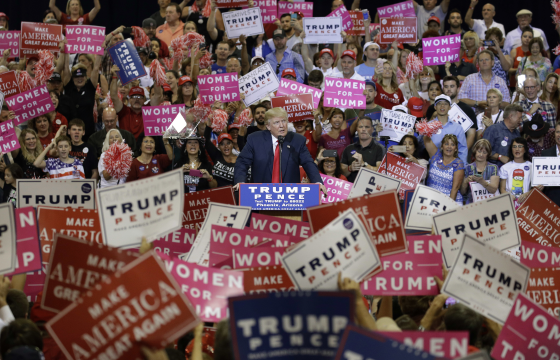Former Harvard psychologist Arthur McCaffrey argues that 'The Donald' could win next week because behind the misogynistic, bombastic stench of Trump is the sweet smell of freedom from a corrupt establishment represented by Hillary Clinton
Non-conformists are fond of citing the Hans Christian Andersen tale The Emperor's New Clothes when discussing the race to the White House: Donald Trump cries 'naked' while Emperor Hillary Clinton acts out a huge lie perpetrated by a professional party machine acting out of self service.
The 2016 presidential election in the US has thrown up two of the most flawed and unpopular candidates for the top office in living memory: one, an outsider whose style, rhetoric, and behaviour turns off millions; the other an establishment insider who drags her checkered past behind her like a shackled prisoner. I profess no love for either candidate, but I would like to propose that taking a closer look at Trump’s dialectic might illuminate what is wrong in the current system of American governance. Thinking like a theologian, would a hermeneutic analysis of the election narrative provide insights into what ails the nation? How can so many people think that Trump is the answer to their nation’s problems? Are their grievances legitimate?
If we can get past the odious traits of Trump and mine for substance might we find some pearls of wisdom? It is true, for starters, that he has struck a chord with his critique of Washington politics and policies. Yet, in the liberal media orbit with its epicentre stretching from New York to Washington DC, 'The Donald' has been harangued and his message slaughtered.
The evening news channels rarely conduct interviews with Trump supporters. When they are derided by Clinton as a "basket of deplorables”, the media tend to take her at her word without bothering to find out what these unknowns actually think about their nation and its government. If commentators did venture out they would find that Trump's iconoclastic, irreverent blasts at the establishment resonate with millions of voters who feel that Congress no longer represents them or their interests. The Trump phenomenon is America’s Brexit (the outcome of which is never far from the Republican candidate's thoughts or speeches) in which the little people—the disenfranchised and ignored—get a chance to deal a mortal blow to the politicians whose neo-liberal agenda has run way ahead of the needs and wishes of the electorate.
The reporting, or rather misreporting, of this election has shown up the superficiality of media coverage: all sound bites and the latest gossip; shock and awe reporting. News media has been invaded by a new breed of Puritans moralising about their self-constructed PC agenda, and quick to exercise trial-by-media, condemning those who dare to be non-conformist—like Trump. No wonder he gets the blue collar vote, for daring to say what they have been feeling for years.
Outside of the media, there are voices that legitimise Trump. People like the respected 'Catholic conservative' Andrew Bacevich, the former Army Colonel who became a Boston University professor. He has been a consistent and vocal critic of the establishment painting a picture that mirrors the invective of Trump. In his book Washington Rules, Bacevich confesses his own Damascus moment was the end of the Cold War which led him to suspect that "orthodoxy might be a sham": "I began to appreciate that authentic truth is never simple and that any version of truth handed down from on high - whether by presidents, prime ministers, or archbishops -is inherently suspect. The powerful ... reveal truth only to the extent that it suits them. Even then, the truths to which they testify come wrapped in a nearly invisible filament of dissembling, deception and duplicity. The exercise of power necessarily involves manipulation and is antithetical to candour."
Trump and Bacevich have similar targets, but different ways of shooting at them. Of course, the argument that anti-establishmentarianism is a construct of the Right was destroyed by the emergence of Bernie Sanders on the far Left of the Democratic party. A civilised revolutionary he argued that US politics no longer stands for the best of representative democracy but moneyed interests and lobbyists.
But instead of Bacevich and Bernie we have Clinton and The Donald - what is to become of us?
For my sins I believe that if Trump is elected, the weight of the presidential office will moderate his bombast and add some gravitas to his demeanour. He will no doubt discover very rapidly that you cannot run a country the way you run a business. But if Clinton is elected I don't expect anything to change. If President Obama could not make the changes to Washington that he campaigned on despite his best intentions, an insider like Clinton will almost certainly deliver next to nothing of note to change a system that is failing.
Dr Arthur McCaffrey is a Catholic writer in Boston, Massachusetts, and a former psychologist at Harvard University




 Loading ...
Loading ...
What do you think?
You can post as a subscriber user ...
User comments (0)